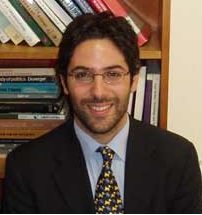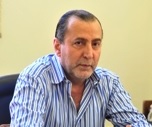- 14 Apr 2014
CRISIS IN THE MIDDLE EAST: THE VIEW FROM LEBANON

Abstract:
The Middle East today is a region in turmoil. Civil war rages in Syria. Egypt is in the throes of a contested counter-revolution. Palestinian-Israeli diplomacy is in danger of collapsing. Iraq is experiencing ongoing violence. Iran pursues a nuclear program that Israel and the West fear could become militarized. Extreme Islamist movements are apparently gaining ground in several countries. Divisions have arisen within the Arab oil-exporting countries of the Gulf Cooperation Council and between the GCC and the United States. Lebanon is a country where all of these issues can be viewed close-up. Indeed, Lebanon itself is in danger of being sucked in to the larger regional turmoil. As part of its ongoing collaboration with the American University of Beirut, MEI invited three scholars from the Issam Fares Institute of Public Policy and International Affairs to present their analyses. This was an opportunity to interact with scholars from a listening post very close to the regional situation.
About the Speakers

Karim Makdisi is an Associate Professor of International Politics in the Department of Political Studies and Public Administration at the American University of Beirut (AUB). He is also as a Senior Research Fellow (and formerly Associate Director) at AUB’s Issam Fares Institute for Public Policy and International Affairs,where he serves as the faculty research director for the “UN in the Arab World” program and lead researcher in the “Shifting Regional Order/Dis-Order” project. Makdisi is also the chairman of AUB’s Master’s Program in Public Policy and International Affairs; was a founding member of and served on the first Board of Trustees of the Arab Council for the Social Sciences. Makdisi’s current research projects include an edited book volume on the UN in the Arab World (University of Minnesota Press); a manuscript analyzing the politics of UN decision-making in Lebanon centered around the2006 war; and a longer-term project on environmentalism. He formerly worked at UN-ESWCA for three years (2001-2004); and his PHD was from the Fletcher School of Law and Diplomacy at Tufts University.

Ahmad Mousalli is a Professor of Political Studies at AUB. Dr. Moussalli obtained his Ph.D. in Government and Politics from the University of Maryland in the USA. His work is concentrated on Islamic political history and studies, Islamic political theories, ideologies of contemporary Islamic movements, cultural theory and studies, political philosophy, and international relations. Dr. Moussalli is the recipient of many academic honors and prizes, including in 2001 selection of Historical Dictionary of Islamic Fundamentalist Movements in the Arab World, Iran, and Turkey as Choice Outstanding Academic book for 2000. His organizational affiliations comprise the Middle East Institute, American Political Science Association, Middle East Studies Association, Society for the History of Islamic Sciences and Philosophy, and International Political Science Association. He has a vast range of publications, including: Moderate and Radical Islamic Fundamentalism: the Quest for Modernity, Legitimacy and the Islamic State (Florida University Press, 3rd edition, 2013); Wahhabism, Salafism, and Islamism: Who is the Enemy? (Conflicts Forum: London and Washington, DC, 2009); US Foreign Policy and Islamic Politics (University Press of Florida, 2008); Images of Islam in the Western World and Images of the West in the Islamic World (Riyadh/Saudi Arabia: Arab-PR, 2002-03); Roots of the Intellectual’s Crisis in the Arab Homeland (Beirut: Dar al-Fikr al-Mu‘asir, 2002); The Islamic Quest for Democracy, Pluralism, and Human Rights (Gainesville/FL, Florida University Press, (2001); and Historical Dictionary of Islamic movements in the Arab World, Iran and Turkey (Scarecrow Press, 1999).

Tariq Tell is a political economist currently teaching at the Centre for Arab and Middle Eastern Studies at the American University of Beirut. He has previously taught at the American University in Cairo and the University of Manchester (UK). He has also held research posts at the International Institute for Strategic Studies in London, and in Amman at the Centre d’Etudes et de Recherche sur le Moyen Orient Contemporain (CERMOC) and the Royal Scientific Society. Tell has co-edited Village, Steppe and State: The Social Origins of Modern Jordan (I.B. Tauris, 1994) and edited The Resilience of Hashemite Rule: Politics and the State in Jordan before 1967 (Cahier de Cermoc, 2001). His book, The Social and Economic Origins of Monarchy in Jordan was published by Palgrave in January 2013. He has degrees from St. Antony’s College (Oxford University), the Institute of Development Studies (University of Sussex) and the London School of Economics and Political Science. His current research interests include the comparative history and politics of Arab monarchies and the relationship between imperialism, food security, and popular protest in the Middle East.




